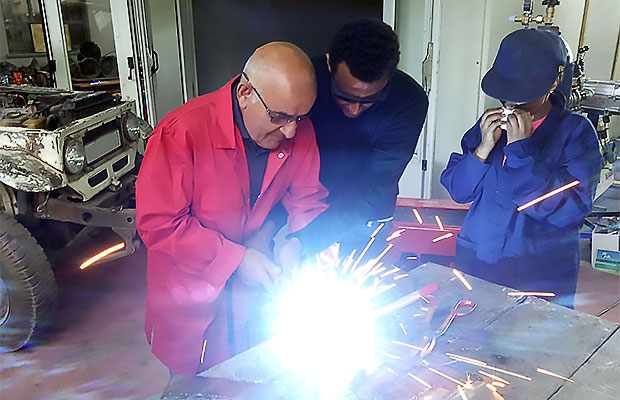
A Second Chance for Street Children
Not long ago, they begged, stole and struggled to survive on the streets of Addis Ababa, Ethiopia — sniffing glue to dull the daily misery of hunger, exploitation and abuse. Now, thanks to a partnership between the Salesians and the United Nations Office on Drugs and Crime (UNODC), these young boys have a new lease on life — and are helping to extend that opportunity to other homeless youth.
Determined to address one of Ethiopia’s most pressing socioeconomic challenges — the increased number of abandoned, runaway and otherwise at-risk children fending for themselves — the Salesians and UNODC launched their first initiative, “Rehabilitation and Reintegration Services for Children in Conflict with the Law,” in November 2015. As a result, 16-year-old Amanuel, 15-year-old Tamiru, and 98 other girls and boys now live at the Bosco Children Project Shelter under the compassionate care of Salesian missionaries.
“In Addis Ababa alone, there are as many as 100,000 children who desperately need assistance in getting off the streets and turning their lives around,” explains Father Mark Hyde, director of Salesian Missions. “Because the Bosco Children Project provides the only shelter and rehabilitation center in Addis Ababa, it’s difficult to adequately address the crisis. This innovative partnership is providing crucial resources — food, educational materials and additional staff — so that we may help as many homeless youth as possible.”
Amanuel found his way to the Bosco Children Project Shelter after spending six grueling months in a detention center for a theft he did not commit. Just two years old when his mother sold him to a “benefactor” who ultimately abandoned him, Amanuel had been living on the streets since the age of 13. He battled cold nights, drenching rains and the constant threat of beatings from older boys who forced him to beg and steal for their own gain.
“Some youth intentionally commit petty crimes, hoping that by being in jail, they will at least have their basic needs met,” says Andualem Tafesse, director of the Bosco Children Project. “Others, like Amanuel, end up in jail without cause. But the end result is the same: when they are released, they have no alternative but to return to their previous lives on the streets. It’s a vicious and hopeless cycle for the children, and for society as a whole.”
Tamiru was even younger — 9 or 10 years old — when he ran away from an abusive aunt who was supposed to care for him. Although he avoided arrest while living on the streets, he was unable to avoid destitution and despair as he begged for scraps of bread night after night. “I sniffed glue because I couldn’t take it any longer,” he recalls. Fortunately, Tamiru was rescued by the staff from the Bosco Children Project during their nightly outreach work last January.
At the shelter, the young girls and boys receive meals, warm clothing, counseling and access to basic education and literacy classes. Once ready, they participate in a skills training orientation, where they experience a variety of vocational courses – auto mechanics, carpentry, culinary arts and more — with an option to choose their favorite. Recently, Amanuel selected metal work while Tamiru opted for leather craft. For the next eight months, the boys and their classmates will develop their knowledge and skills as they prepare to support themselves as independent adults. Once they complete their training, Bosco Children Project will provide financial and career-placement assistance for up to five months, as the students seek jobs and permanent housing.
“I am very happy for this opportunity,” says Amanuel. “Now I can think about my future. The counselors at Don Bosco helped me change my attitude and my life!” Tamiru agrees. “The world has changed for me since coming to Don Bosco. I am a new person.” In gratitude for the opportunities given to them, both boys now join staff on evening rounds of the streets, encouraging other children to seek help from the Bosco Children’s Project.
“Girls and boys living on the streets want to be reintegrated into society,” says Mr. Tafesse. “But they don’t know how to make it happen. We are so grateful to our partner organizations and our other benefactors for helping us show them the way.”
Our mission saves street children and gives them new hope. What’s your mission?

